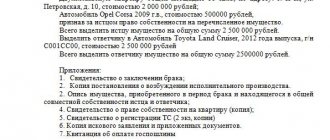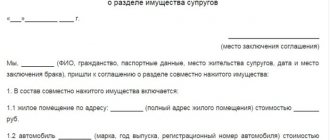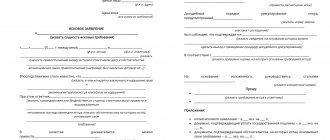Statement of claim for inclusion of property in the inheritance estate
A sample statement of claim for the inclusion of property in the estate, taking into account the latest changes in the legislation of the Russian Federation.
It is no secret that not all property owned by citizens is legally registered. Therefore, problems very often arise with the inheritance of such property. According to the norms of the law, when forming an inheritance file, a notary must indicate in it all the property that certainly belongs to the testator and can be transferred to the heirs.
Dear readers! Our articles talk about typical ways to resolve legal issues, but each case is unique.
If you want to find out how to solve your particular problem, please contact the online consultant form on the right or call:
- 7 ext. 987 (Moscow and region)
- 7 ext. 133 (St. Petersburg and region)
- 8 ext. 652 (Regions)
It's fast and free!
However, if the property is not registered with the testator, even though the latter is its owner, then such property most likely will not fall into the inheritance mass. This means that it will not be possible to obtain a certificate of inheritance rights for him in the usual manner.
Very often in such situations, citizens write complaints against a notary, however, according to the requirements of Article 49 of the Fundamentals of the Legislation of the Russian Federation on notaries, such issues should be considered only by the court.
Accordingly, the heir, in order to include the property in the estate, must apply to the court at the place where the inheritance was opened with a statement of claim, a sample of which is presented below.
The difficulty in drawing up such a statement of claim is that the plaintiff will need a lot of documents to recognize the testator’s ownership of the property that belonged to him during his lifetime. Because otherwise it will not be possible to inherit it. This process, frankly speaking, is long and rather thorny. However, if we are talking about real estate, then it is certainly necessary to fight for it.
It should be noted that very different situations can arise in life, therefore, if necessary, the presented sample claim can be modified. As for its technical part, it is standard. All other heirs will be defendants in such a claim.
The claim is filed exclusively in the district court, regardless of the value of the disputed property.
B_______________________________________ (Name of court, address)
Plaintiff__________________________________________ (full name, phone number, address)
Defendant________________________________(full name, phone number, address)
The cost of the claim is __________ rub. ____ kop.
State duty __________ rub. ____ kop.
Statement of claim
on the inclusion of property in the inheritance mass
“___” “___________” died in 20__ _________________ (full name of the testator). Currently, the notary _________________ (indicate the full name of the notary, his address) has opened an inheritance case ___________________ (indicate details) in connection with the death of ___________________ (full name of the testator).
I, ___________________ (full name of the plaintiff) am related to the testator and am related to him _______________ (specify by whom).
The composition of the inherited property, which is indicated in the inheritance file, does not include the following property __________________ (indicate the property, its location, distinctive characteristics).
I believe that this property should be included in the inheritance, since it belonged to the testator, as well as ______________________ (indicate other reasons for the need to include the property in the inheritance).
Taking into account the above, guided by Articles 49 of the Fundamentals of the Legislation of the Russian Federation on Notaries, 1112 of the Civil Code, 131, 132 of the Civil Procedure Code of the Russian Federation,
Include ____________________ (list the property, its location and characteristics) in the estate to be inherited after the death of _____________________ (full name of the testator).
1. Copies of the statement of claim (according to the number of defendants);
2. Receipt for payment of state duty;
3. Documents confirming the relationship between the plaintiff and the testator;
5. Other documents confirming the plaintiff’s arguments.
“___” “________” 20__ ________________ (signature of the plaintiff)
Include the following property in the inheritance property opened after death (full name of the deceased, date of death) (list the disputed property).
- Recognize (full name of the plaintiff) the ownership of the following property (list the disputed property).
- List of documents attached to the application (copies according to the number of persons participating in the case):
- Copy of the statement of claim
- Document confirming payment of state duty
- Death certificate of the testator
- Contracts, agreements and other documents confirming the rights of the deceased to property to be included in the inheritance mass
- Certificate of property value
- Documents confirming the rights of the heir
- Other documents confirming the requirements for the statement of claim for inclusion of property in the inheritance estate
Application submission date ""
I, II or III degrees. Dependents Dependents entitled to a share in the inheritance are those persons whose condition meets the following conditions:
- Disability. Dependents are pensioners receiving an old-age pension, disabled people of groups I, II or III, children under 16 years of age who have completed their studies or 18-year-old students;
- owner of the property and living with him for one year or more until his death.
Who is not entitled to the obligatory share:
- Legal successors belonging to the II - VII stages;
- Successors by right of representation (if their parents died before the death of the testator), provided that they were not dependents
The size of the obligatory share of the inheritance Regardless of the size of the inherited property, the obligatory share is allocated within the minimum limits established by law.
Federal Law "On Labor Pensions in the Russian Federation" labor pension is a monthly cash payment in order to compensate insured persons for wages and other payments and rewards lost by them due to the onset of incapacity due to old age or disability, and for disabled family members of insured persons - wages and other payments and benefits of the breadwinner lost due to the death of these insured persons, the right to which is determined in accordance with the conditions and norms established by this Federal Law.
In accordance with Art. 7 of the Federal Law “On Labor Pensions in the Russian Federation”, men who have reached the age of 60 years and women who have reached the age of 55 have the right to an old-age labor pension.
Property acquired by spouses during marriage (common property of spouses) includes the income of each spouse from labor activity, entrepreneurial activity and the results of intellectual activity, pensions, benefits received by them, as well as other monetary payments that do not have a special purpose (amounts of material assistance, amounts paid in compensation for damage due to loss of ability to work due to injury or other damage to health, and others).
The common property of the spouses also includes movable and immovable things acquired at the expense of the spouses' common income, securities, shares, deposits, shares in capital contributed to credit institutions or other commercial organizations, and any other property acquired by the spouses during the marriage, regardless of whether in the name of which of the spouses it was purchased or in the name of which or which of the spouses contributed funds.
A citizen is considered disabled in cases where: the day of his coming of age coincides with the day of opening of the inheritance or is determined by a later calendar date; the day of his birth, which is associated with reaching the age that gives the right to establish an old-age labor pension, is determined by a date earlier than the day the opening of the inheritance, his disability is established from the date coinciding with the day of opening of the inheritance or preceding this day, indefinitely or for a period until the date coinciding with the day of opening of the inheritance, or until a later date (clauses 12 and 13 of the Rules for recognizing a person as a disabled person, approved by a resolution of the Government of the Russian Federation Federation dated February 20, 2006 N 95 On the procedure and conditions for recognizing a person as disabled) In accordance with the certificate I have, my disability was established in 2007 for an indefinite period. In accordance with Art.
Collection of documents required for consideration of the case
We invite you to read: New law against debt collectors
, is the most difficult task assigned to the interested plaintiff, who intends to fulfill
into the hereditary mass. You can convince the judge of the need to make a decision to include certain objects in the mass of inheritance if there is a legal document
and other papers allowing one to conclude that the deceased has
As a general rule, the following must be attached to the claim:
- additional copies, depending on the number of participants;
- initiator's passport;
- documents on the death of a relative and the existence of a relationship with him;
- will (if any);
- conclusions on the value of those items that have already been approved for distribution among the heirs.
You will need to pay to the court hearing the case
The main text of the document indicates: date of death and full name. the testator, information about all heirs, the composition of the inherited property, individual characteristics of property not included in the inheritance. It is necessary to provide arguments and evidence that the testator has ownership rights to such an object.
- Copy of the statement of claim
- Receipt for payment of state duty
- Death certificate of V.S. Tsvetkova
- A copy of the resolution of the Committee for Municipal Property Management of the Administration of the village. Big village No. 18/58n dated March 19, 2006
- Certificate-extract dated 04/01/2006
- Cadastral passport indicating the value of the property
Sample application
An application for inclusion in the estate, a sample of which we are considering, is filled out in the prescribed form. The claim for inclusion of property in the estate must contain the following columns:
- “Cap” with the name and address of the judicial authority where the case is being considered;
- Full name of the heir who filed the claim;
- Full name, address of the defendant;
- Full name of the notary organization, address;
- In the middle, enter the title of the document:
- The main part contains information about the deceased, residence, date of death, applicants for inheritance;
- A complete list of property, description, valuation, along with the subject of the claim;
- Reasons for refusal to recognize the estate;
- Arguments, documentary evidence of facts allowing the inclusion of a land plot, real estate, and other property in the inheritance mass;
- Forgiveness for the inclusion of property as part of the estate;
- Describe the documents provided;
- Confirm the document with a signature;
- Set the date.
The process will include several important steps.
- Identify property not included in the estate.
- Carry out the process of preparing documents.
- Competently draw up a statement of claim.
- Pay the state fee.
- Applications can be submitted in person or sent by registered mail with confirmation of delivery.
- Take part in a court hearing.
- After making a decision, if the result is positive, contact a notary.
- Re-registration should be carried out promptly.
We recommend reading: Heirs of the second stage by law
A sample application to the court for inclusion in the estate is the most important document that allows you to correctly describe the problem. The actual use of the apartment must be officially registered by filing a claim in court.
Judicial practice suggests many different options when citizens can file a claim and draw up statements. After the divorce, a statement of claim for the recovery of alimony, a share of jointly acquired property. In the event of an accident, the statement of claim may contain demands to compensate the victim for damages. Incorrectly specified apartment data when drawing up a will may cause it to be declared invalid and lead to the need to file a statement of claim demanding that the property be recognized as part of the estate.
You need to contact the judicial authority located at the place where the property is registered. You can deal with the issue personally or through a representative by issuing a power of attorney for him. Wrong choice of organ can cause failure. Paying attention to the correct choice of organ is extremely important. If in doubt, it is advisable to contact a specialist. A mistake can be fatal. Repeated applications will not be accepted.
Court decisions.RF Decision
Thus, judicial practice proceeds from the fact that rights under commission agreements and agency agreements cannot be inherited; the statement of claim for the inclusion of property in the estate must contain confirmation of all common inheritance rights.
You are the heir of the first stage and without your consent and participation the inheritance will be given to anyone within 6 months. cannot be alienated. If you know the exact address and land area. plot, you can request an extract from the Federal Reserve System - such information when paying for the state. duties 100 rub. available to anyone. Be sure to seek help from a lawyer (then in court you will recover these costs as legal costs in a lawsuit, if the cost of such services is 20-30 thousand rubles). Otherwise, I completely agree with Alexander.
The most pleasant thing is to tell your interlocutor what he wants to hear. But.. . Since the beginning of 2008, the rights of the supervisory court have been significantly limited. The Supreme Court of the Russian Federation even adopted a resolution according to which, based on the principle of legal certainty, the disagreement of the supervisory court with the decision made on the grounds that the supervisory court would have made a different decision cannot serve as a basis for cancellation of the decision, if there is no significant violation of the norms of substantive or procedural law (Resolution of the Plenum of the Armed Forces of the Russian Federation No. 2 of February 12, 2008
, paragraph 4 of paragraph 6). At the same time, according to paragraph 1 of Art. 1112 of the Civil Code of the Russian Federation, the inheritance includes not only things and other property that belonged to the testator on the day the inheritance was opened, but also property rights and obligations. The right to privatize housing is certainly one of the property rights.
Based on this, in the practice of the same Armed Forces of the Russian Federation, it was allowed to include the right to privatize housing in the composition of the inherited property (Resolution of the Armed Forces of the Russian Federation No. 8 of August 24, 1993, which remains in force). However, as the Supreme Court of the Russian Federation explained, only the filing of an application for privatization should be recognized as a proper expression of will.
We are drawing up a statement of claim: Name of the court (federal court only) Plaintiff: Full name, date and place of birth, place of residence. Defendant: Federal Tax Service of the municipality (since the testator did not have time to register the ownership right) “On inclusion in the inheritance mass and recognition of the right of ownership of inherited property.” Amount of claim: RUB 1,000,000.
STATEMENT OF CLAIM We state the essence, referring to the fact that the relative did not have time to register the property in the manner prescribed by law. We refer to Articles 218, 1112, 1142, 1152 of the Civil Code of the Russian Federation, and ask the court, I ASK: 1. To include in the inheritance mass of the testator (full name, death certificate, date of death) inherited property in the form (in this case, land plot, indicate area and location). 2.
Recognize ownership (of a land plot, area, location) - for (F.I.O. of the heir). 3.Exclude from the number of owners of the land plot (full name of the testator). 4. Request from the notary (address) the inheritance file (full name of the testator and the date of his death) Attached: Copy of passport Copy of birth certificate Copy of death certificate Copy of the resolution on the allocation of a land plot Copy of the cadastral extract Receipt for payment of state duty (date ) (signature)
Legal Practice Reviews {amp}gt;
A.I. Nikulin is a lawyer at the Bar Association of the Irkutsk Region.
"Baikal Legal Center"
REVIEW based on the results of generalization and analysis of practice
consideration by district courts of Irkutsk of cases on claims for inclusion of property in the inheritance mass
The Constitutional Court of the Russian Federation in its resolution of January 16, 1996 No. 1-P, revealing the constitutional and legal meaning of the right of inheritance provided for in Art. 35 (h.
4) the Constitution of the Russian Federation and regulated by civil legislation, noted that it ensures a state-guaranteed transfer of property that belonged to the deceased (testator) to other persons (heirs). This right includes both the right of the testator to dispose of his property and the right of the heirs to receive it.
The right of inheritance in combination with the two named powers also follows from Art. 35 (Part 2) of the Constitution of the Russian Federation, which provides for the opportunity for the owner to dispose of the property belonging to him, which is the basis for freedom of inheritance.
Inheritance is carried out by will and by law. At the same time, when inheriting property both by law and by will, heirs often turn to the courts to confirm the testator’s rights to the property for which the inheritance has been opened, as well as on issues of determining the composition of the inherited property.
Most often, legal disputes arise in cases where an inheritance is opened for real estate, primarily for a residential building or apartment. To obtain a certificate of inheritance rights to a residential building, heirs must submit documents confirming the legality of its construction and ownership of the deceased citizen. Such a document is primarily an extract from the Unified Register of State Registration of Rights.
If you have title documents for a residential building and apartment, considering cases of this category is not particularly difficult. At the same time, the absence of such documents entails the obligation for the heirs to prove in the procedure of claim proceedings that the building (apartment) belongs to the testator, and after his death, to them, as well as the right to unauthorized construction.
2007 No. 15), it was stated that the court does not have the right to satisfy the demands of the heirs to recognize their ownership of unauthorized buildings or premises, since only property that legally belonged to the testator can be included in the inheritance mass.
Case No. 2-189/2016
SOLUTION
IN THE NAME OF THE RUSSIAN FEDERATION
December 15, 2021 p. Teguldet
Teguldetsky District Court of the Tomsk Region, composed of: presiding judge A.A. Rodikov, with the secretary of the court session L.N. Viktorova, with the participation of the plaintiff N.P. Yudina.
, in the absence of a representative of the defendant Administration of the Beregaevsky rural settlement of the Teguldetsky district of the Tomsk region, having considered in open court a civil case based on the claim of Yudina N.P.
We invite you to read: What does a third party mean in legal proceedings?
to the Administration of the Beregaevsky rural settlement of the Teguldetsky district of the Tomsk region on the inclusion of property in the inheritance mass,
Yudina N.P. filed a lawsuit against the Administration of the Beregaevsky rural settlement of the Teguldetsky district of the Tomsk region for the inclusion in the inheritance estate remaining after the death of P., deceased /./, of a residential building located at the address: /./, with a total area of /./ square meter , living area /./ square meter, having inventory number /./.
appealed to a notary, the plaintiff was issued a certificate of the right to inheritance under a will for a land plot located at the specified address, but was refused to issue a certificate of the right to inheritance for a residential building due to the fact that it was not possible to establish that the above residential building belonged to the deceased P., since the decision of the Teguldetsky District Court of the Tomsk Region dated March 17, 2016 recognizing P.’s property rights.
the residential building did not come into legal force until his death, the ownership of the residential building was not registered.
The representative of the defendant, the Head of the Administration of the Beregaevsky rural settlement of the Teguldetsky district of the Tomsk region, Zh., submitted a written statement to the court recognizing the claim. It follows from the statement that the provisions of Articles 39, 173 of the Civil Procedure Code of the Russian Federation are clear to the defendant’s representative.
As follows from parts 1, 2 of Article 39 of the Civil Procedure Code of the Russian Federation, the defendant has the right to admit the claim; the court does not accept the recognition of the claim by the defendant if this is contrary to the law or violates the rights and legitimate interests of other persons.
In accordance with Article 1 of the Law of the Russian Federation dated July 4, 1991 No. 1541-1 “On the privatization of housing stock in the Russian Federation,” privatization of residential premises is the free transfer into ownership of citizens of the Russian Federation on a voluntary basis of residential premises occupied by them in state and municipal housing fund, and for citizens of the Russian Federation who have reserved occupied residential premises - at the place where the residential premises were booked.
According to Article 2 of the said Law of the Russian Federation, citizens of the Russian Federation who have the right to use residential premises of the state or municipal housing stock on social rental terms have the right to purchase them on the terms provided for by this Law, other regulatory legal acts of the Russian Federation and regulatory legal acts of the constituent entities of the Russian Federation, into common ownership or into the ownership of one person, including a minor, with the consent of all adults and minors aged 14 to 18 years who have the right to privatize these residential premises.
In accordance with Article 1113 of the Civil Code of the Russian Federation, inheritance opens with the death of a citizen.
Where to go?
Regardless of the basis on which property is inherited, you will need to visit a notary’s office. The appeal is carried out in the place where the deceased is registered. In addition, appeal is allowed in the place where the real estate included in the inheritance mass is located. If there are several of them, then at the location of the nearest one. To ensure the safety of the property, you will need to appoint a caretaker. This issue needs to be addressed immediately after the death of a citizen.
You need to know what time to contact a notary. This must be done within the period specified in legal acts. The legislator allocates a six-month period for the procedure. At this time, you need to have time to submit an application that the heir accepts the property. If the successor has not done this, then by law it is considered that he has waived his rights.
If not all property was included in the estate
Actually no. But depending on the situation, maybe there is... Situation unknown
Inclusion in the hereditary mass. Considering that the unauthorized construction is not property legally owned by the testator, it cannot be included in the inheritance estate.
With a court decision in the first interpretation, you need to contact a notary, who must issue a certificate of the right to inheritance on this basis. With a court decision in the second version - bypassing the notary directly to Reg. service for registering rights if it is a real estate property
Well, yes, but what is the question?
What property is not included in the estate? The law does not contain a list of property included in the inheritance subject to division. Consequently, when dividing the hereditary mass, it is necessary to resolve the issue of whether
So contact a notary
After the death of this person, inherited property remained in the form of apartment lt at 1 gt. However, the notary denied the issuance to the plaintiff. The plaintiff also filed an updated statement of claim, in which Maksimyuk E.P. asks the court to include in the inheritance mass after Yu
If the shares are not defined, then they are considered equal, i.e. in your case, each spouse has 1/2.
Inheritance is hereditary property, inheritance mass. If after the issuance of a certificate of the right to inheritance, inherited property is discovered that is not included in the certificate, an additional certificate is issued for this property.
What is hereditary mass
The estate refers to the property that belonged to a person at the time of his death. Such property passes to the heirs.
The rights of the deceased to the object play a key role when registering an inheritance. A citizen cannot bequeath or inherit by law objects that do not belong to him by right of ownership or by the right of lifelong inheritable possession.
Recipients of property must submit title documents to the notary. In the absence of the necessary documentation, the object is not subject to inclusion in the inheritance mass.
What to do if the testator did not manage to register the property right? Here it is necessary to take into account existing judicial practice. The basis for accepting an inheritance is a document confirming the transfer of property to the testator (clause 11 of the Resolution of the Plenum of the Supreme Court and the Supreme Arbitration Court of the Russian Federation No. 10/22).
The reasons for the lack of title documents may be different. The testator did not have time to register ownership or privatize the apartment. Sometimes papers are lost. Naturally, without documents, the notary denies applicants the inclusion of assets in the inheritance.
Let's consider whether the inheritance includes the obligations of the testator . The debts of the deceased are an integral part of the inheritance mass (Article 1175 of the Civil Code of the Russian Federation).
An exception is obligations that are inextricably linked with the personality of a deceased citizen. For example, monthly alimony payments or payment of a fine for violating traffic rules.
Although alimony payments are not collected from heirs, arrears in alimony payments that arose during a person’s lifetime must be repaid from the inheritance. The obligation to pay the debt is distributed among the heirs in accordance with the size of the share of the property they accepted.
the marital share of property is not included in the inheritance . It is subject to allocation until the division of the inheritance between the applicants. It is enough for a husband or wife to submit an application. On its basis, the notary will issue the co-owner with a corresponding certificate of allocation of the marital share (Article 1150 of the Civil Code of the Russian Federation).
The procedure for including property in inheritance
Civil lawyer38
(recognition of ownership rights of the deceased); (recognition of property rights of the deceased); DECISION
presiding judge Volkova A.V.
under secretary V.S. Muravyova,
having considered in an open judicial conference the court case on the claim of Maksimyuk E.P. to the Authority of the Primorsky District of St. (recognition of ownership rights of the deceased) - Petersburg, Kudryashov A.S. on the inclusion of property in the inheritance mass, recognition and registration of ownership rights to the disputed apartment or recognition of ownership of an apartment,
(recognition of ownership rights of the deceased); (recognition of ownership rights of the deceased); DEFINED: Maksimyuk E.P. filed a claim with the Primorsky District Court of St. Petersburg (recognition of property rights of the deceased) against the Primorsky Real Estate Administration (district agency) of the Committee for the Management of Municipal Property of St. Petersburg, in which it shows that the plaintiff appears to be an heir under the will after Yu (recognition of property rights of the deceased) .
, who died on March 13, 2009. After the death of this person, inherited property in the form of an apartment remained. But the notary refused to issue the plaintiff a certificate of the right to inheritance under a will, indicating the lack of registration (recognition of ownership of the deceased) of Yu.’s ownership of this apartment at the time of his death. As the plaintiff shows, on February 12, 2009 Yu.
Having considered in open court a civil case on the claim of Maksimyuk E.P. against the Administration of the Primorsky District of St. Petersburg, Kudryashov A.S. on the inclusion of property in the inheritance estate, recognition of ownership of the apartment
Firstly, there is no need to turn the statement into a script for a tragedy series for 1800 episodes. The longer the content of the application, the less likely it is that the court will be able to really figure out what the problem is. If possible, then 2-3 pages will be enough. Second, tie the narrative to existing evidence.
The less informational “water” there is in the claim and the more specifics, the better. In addition, this will allow you to adhere to the first recommendation for filing a claim. And thirdly, present your presentation consistently, strictly according to the structure, which will be discussed below. Do not try to first talk about the problem that arose when trying to enter into an inheritance, and only then report about the very fact of opening an inheritance and the fact that the notary considered the existing documents insufficient to formalize the inheritance. You will confuse the judge.
How can this be? Let's take the following example. A certain citizen was a member of a gardening partnership that operates on a non-profit basis. For the services that this citizen provided to the partnership, at its general meeting, a plot of land was allocated from public lands. At the same time, a certificate was issued from the chairman of this partnership, as well as an extract from the general meeting, which indicated the provision of land.
The citizen did not register ownership of it. When this citizen died, and his heirs, using their right, tried to inherit this plot of land on the basis of these documents, the notary did not accept these documents from them, since for him they were not the basis for including the plot of land in the inheritance estate.
That is, the plot of land was not considered by the notary as an inheritance. This means that the heirs could not receive this piece of land as private property upon entering into an inheritance. All that remained was to prepare a statement of claim for inclusion of a plot of land in the inheritance estate. The documents previously issued to the deceased, namely the certificate and the extract, were precisely those factual documents that the court carefully examined.
We suggest you read: Litigation with debt collectors, judicial practice
In addition, the court took into account testimony from members of the gardening partnership that the deceased during his lifetime actively used the plot of land and looked after it. Receipts for payment of membership fees and taxes for a plot of land documented the words of the witnesses. Based on the factual materials of the case, the court decided to satisfy the claim in full and include the land plot in the inheritance mass.
This story with a happy ending, if, of course, you do not take into account the fact of the death of the testator, is taken from legal practice. Let us now consider the question of how to draw up a statement of claim to protect your legal rights in order to include property in the inheritance mass. You will be hard pressed to find examples of such statements recognizing rights to private property and property ownership.
If only because the situations in such cases are different and very atypical, there is no single model. Therefore, we will deal with the difficulty of the lack of a typical sample in the following way. We will analyze what should be included in such a document, on the basis of which you can draw up samples of such documents yourself.
- Related Posts
- How much does it take to get a cadastral passport for an apartment?
- Submitting an Application to the Registry Office for Unilateral Divorce
- How to draw up a car purchase and sale agreement yourself
- Is it possible to register in emergency housing?
The distribution between legal successors is subject to:
- the whole list of things, incl. cash;
- the existing range of property rights arising as a result of concluded agreements, legal relations of an intellectual nature, etc.;
- a fixed list of property obligations expressed in the form of debts to creditors.
The legislator limited the obligations of the recipient of the inheritance in terms of fulfilling the obligations that arose during the life of their bearer. This limitation is set within
the property that was received by the heir. This means that the performance of the duties of the testator must be performed exclusively for his
Most often, citizens inherit immovable and movable things belonging to the deceased, rights and those obligations that arose during his life and were not fulfilled on the day of death.
About the need to include a certain object or item in the inheritance to be distributed, declare
anyone can.
The person can approve or deny the application himself.
. If you disagree with his position, it is necessary to prepare and send to.
A complaint sent to the Notary Chamber may not give the required result. As a result, it is impossible to do without the participation of the court.
First of all, the question of including new property in the estate of inheritance must be raised before
. It is he who must decide whether to include the property in the list of inheritance. Only when the official refuses to satisfy the request can you proceed to
The claim must be transferred to the court that is located in the same territorial location as the Defendant.
The claim must comply with the standards defined in the Code of Civil Procedure. The main requirements are related to the reflection in the document:
- name of the court;
- information about the plaintiff and defendant;
- the name of the notary office, as well as information about the notary conducting the case;
- information concerning the testator, which must be indicated in the descriptive part;
- a list of those things that were not included in the inheritance;
- the grounds referred to by the notary when granting the refusal;
- indications of those documents that indicate that the listed property was the property of the deceased
The petition part must contain a reasoned
plaintiff, based on
reflected in the application.
At the end of the document, the plaintiff puts down
signing and own
All-Russian Center for Financial Solutions
Case No. 2-189/2016
SOLUTION
In accordance with Article 1115 of the Civil Code of the Russian Federation, the place of opening of the inheritance is the last place of residence of the testator (Article 20).
In accordance with paragraph 1 of Article 1119 of the Civil Code of the Russian Federation, the testator has the right, at his own discretion, to bequeath property to any persons, to determine the shares of heirs in the inheritance in any way, to deprive one, several or all heirs of the inheritance by law, without specifying the reasons for such deprivation, and in cases provided for by the Civil Code of the Russian Federation, include other instructions in the will. The testator has the right to cancel or change the completed will in accordance with the rules of Article 1130 of the Civil Code of the Russian Federation.
As follows from the first paragraph of paragraph 1 of Article 1152 of the Civil Code of the Russian Federation, in order to acquire an inheritance, the heir must accept it.
In accordance with the first paragraph of paragraph 2 of Article 1152 of the Civil Code of the Russian Federation, the acceptance by the heir of a part of the inheritance means the acceptance of the entire inheritance due to him, no matter what it is and no matter where it is located.
According to paragraph one of paragraph 1 of Article 1154 of the Civil Code of the Russian Federation, an inheritance can be accepted within six months from the date of opening of the inheritance.
As established by the court, by the decision of the Teguldetsky District Court of the Tomsk Region dated March 17, 2016, the claim of P.
to the Administration of the Beregaevsky rural settlement of the Teguldetsky district of the Tomsk region on the recognition of ownership of the house was satisfied, P.’s ownership of the house located at the address: /./, with a total area / was recognized.
/ square meter, living area /./ square meter, inventory number /./, in the order of privatization, which is confirmed by a copy of the said court decision.
This decision of the court came into force on April 22, 2016.
Thus, at the time of P.’s death, the said court decision did not enter into legal force.
Meanwhile, as follows from the said court decision, the plaintiff’s property right was recognized due to privatization.
Please specify your question... As far as I understand, you have documents on entering into an inheritance, according to which you are already the owner (registration in this case is required only to complete a transaction, this is the only exception when property rights do not need to be registered)
Completion of the trial
Any trial ends with a court decision. If the procedural document is too long, then the court can announce only the operative part (Article 199 of the Code of Civil Procedure of the Russian Federation).
A reasoned decision must be drawn up within five days after the end of the proceedings. The procedural document is handed over to the participants in the process.
If the plaintiff or defendant was not present at the court hearing, then a copy of the decision is sent to him by mail. The action is carried out within 5 days from the date of the final court decision (Article 214 of the Code of Civil Procedure of the Russian Federation).
Let's consider whether the parties can appeal the judicial act. Participants in the trial are given a month to file an appeal. If the complaint is not received, then the decision of the court of 1st instance comes into force. If the plaintiff or defendant filed an appeal, then the decision comes into force following a review in the court of 2nd instance.
Inheritance 24
- copies of the statement of claim according to the number of defendants;
- original receipt of payment of state duty;
- original and copy of the death certificate of the testator;
- original and copies of documents confirming the rights of the heir;
- originals and copies of documents related to the disputed property.
- Chapter 61 includes articles on general provisions.
- Chapter 62 describes the process of obtaining an inheritance under a will.
- Chapter 63 is responsible for covering the topic of “inheritance by law.”
- Chapter 64 regulates the process of acquiring inherited property.
- 65 describes the intricacies of inheritance of certain types of property.
Inclusion of certain property in the estate
Do you have a dispute related to inheritance? Do you need to include certain property in your estate? We will help you with this! Let us evaluate the legality of the procedure for determining the inheritance mass. We will study all the circumstances of the case. We will collect everything necessary and draw up the necessary documents. We will represent your interests in the judicial authorities!
There are various reasons for this phenomenon. As a rule, they arise due to the fact that the testator did not have time to draw up the necessary documents for the property during his lifetime. As a result, we get a situation where there is property, but there are no rights to it yet. There are also mistakes made by notaries.
Deadlines and procedure for submitting an application
Inclusion in the estate and recognition of ownership may be necessary in case of mistakes made, lack of registration, or lost documents. The inclusion of property in the estate must be carried out in accordance with the procedure established by law.
Acceptance of inheritance and entry into ownership must be formalized in court. In the order of inheritance, a statement of claim is submitted to the court. There is no clearly defined period, but it is advisable to complete the action within six months.
There are a number of cases when activities are necessary:
- The deceased did not have time to legitimize the construction. Unauthorized buildings are not considered property;
- Housing is not privatized. Can be transferred to municipal records;
- Availability of funds in shares or securities;
- Paid, purchased real estate, without registration;
- Errors during registration made by the notary.
In practice, there are many cases that lead to the need to prove ownership as part of the inheritance estate. These cases are unique.
There can be many reasons for the issue:
- At the time of death, the deceased was divorced from his wife. There was no actual division of property. The notary refused to recognize the claimant's rights to the share. The property is jointly acquired, which has to be proven in court.
- The deceased was purchasing real estate in a house under construction. Documents for housing and registration will be issued after the delivery of the property. It is necessary to prove the fact of payment and the existence of rights to the property.
- A vehicle has been purchased. Payment has been made, registration with the traffic police has not been carried out. We prove the fact of purchase and sale.
- Home construction. They did not have time to legalize the building.
- Buying land. Transferring it from one status at the stage of commission.
- Transfer of real estate from residential status.
- The notary made a mistake; he incorrectly indicated the address of the object, the details of the heirs, and the model of the vehicle.
We recommend reading: Agreement on the division of inherited property between heirs








